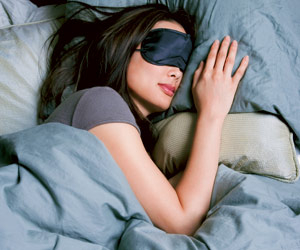
The longer days and sky-high temperatures of a UAE summer can play havoc with our sleep patterns. Although in this region we’re lucky enough to have lots of light all year round, the time at which the sun rises winds back from a civilised 7am in the winter to a more intrusive 5.30am in the summer, which can impact sleep quality, says Dr Maria Ridao Alonso, medical director at The Dubai Herbal and Treatment Centre.
“Light coming through curtains that aren’t thick enough means people tend to wake up earlier in summer,” she says. “Also if the AC is noisy, it can affect sleep patterns when left on at night, and of course a room that’s too hot or too cold can disturb sleep.”
Seasonal Affective Disorder (SAD) – which is known to cause depression in people living in cold climates – is usually associated with winter, but UAE residents may be prone to an inverted variety of the condition after being trapped indoors due to the heat of the summer months, according to a Zayed University study. One of the symptoms of SAD is insomnia, says Dr Liza Thomas, specialist in internal medicine at the Canadian Specialist Hospital in Dubai. “Other symptoms include poor appetite, weight loss, irritability, difficulty concentrating and crying spells, all of which can make falling asleep difficult,” she says. “In the summer, people who are sensitive to weather changes tend to be more nervous, anxious or excited, and this interferes with their sleep.”
Claire Stone, a 32-year-old public relations consultant, knows this all too well. “I’ve never been a great sleeper and find I suffer particularly in the summer with the difference in light and warmer temperatures,” she says. “I’ve tried everything from sleeping pills, which I hated as they gave me a sluggish feeling the next day, to hypnotherapy, but nothing really worked.” Claire has devised her own sleep strategy, which includes taking a vitamin B-complex supplement as well as magnesium, to help her overcome the problem (for more on supplements to help you sleep see page 74). But it is important to identify your problem precisely with a doctor before self-medicating with supplements, warns Dr Alonso. Are you having difficulty falling asleep? Or do you have disrupted sleep? “There are very effective herbs that can help you relax and sleep through the night. If hormonal imbalances are the root cause, sometimes the hormones you are lacking need to be given. But self-medication without consulting a doctor is not advisable.”
Although sleeping problems can have a seriously negative impact on your well-being, they can often be addressed quite easily, says Dr Alonso. “Sometimes adjusting little things can make a big difference. Simple thing like not having a late or heavy dinner and not exercising late at night can help. Depending on individual assessments sometimes medication may be required.” Follow our seven steps to good sleep to have you in the land of nod in no time.
1. Eat snooze-friendly foods
What you eat can help your body to be more receptive to sleep, according to Lorna Driver-Davies, nutritionist for the Nutri Centre (www.nutricentre.com). She suggests increasing your intake of pumpkin seeds, nuts, dark green vegetables and cherries. “Pumpkin seeds are rich in amino acids, which are required to help manufacture melatonin, the sleep-inducing hormone,” she says. “Essential fats found in pumpkin seeds are also helpful for improving metabolism. Take a handful before bed.” Nuts and dark green vegetables, she says, are all rich in the mineral magnesium, which is known as a ‘nature’s tranquilliser’ and commonly used as a sleep aid. Cherries also contain small amounts of the hormone melatonin.
2. Stabilise your sugar intake
An inability to sleep can often be associated with fluctuating blood-sugar levels, as it’s common for people to struggle to sleep when these fall, says Alli Godbold, a nutritional therapist and author of Feed Your Health. “To prevent this problem, sugar and refined carbohydrates should be avoided as much as possible, and it’s also a good idea to cut back on stimulants such as coffee, tea, cola and chocolate throughout the day and avoid them all together in the evening.”
3. Calm those restless legs
Restless Leg Syndrome (RLS) can vary in severity and causes an irresistible inclination to move your legs. It can cause discomfort in the feet, calves and thighs and in many cases, the condition can be distressing and disruptive and affect daily activities, including sleep. In the UAE most people affected by restless legs also suffer from diabetes, says Dr Alonso, “and the incidence of diabetes is particularly high in this country.” But it is a world-wide problem. “Over 50 per cent of people in the UK suffer with sleep disorders of some kind, generally attributed to a stressful lifestyle, and RLS is very common,” says acupuncturist Rachel Peckham. She says acupuncture can calm the nervous system and may boost hormonal output by increasing endorphin production.
4. Rethink your mattress
Although popular wisdom dictates that a firm mattress is best for your back, this isn’t always the best option for those who have trouble sleeping. “Switching my mattress really helped me to fall asleep more easily,” says Claire. “I’ve found it’s far better to opt for a mattress that suits you, one that offers the kind of comfort you need in order to get to sleep, as well as support.”
5. Clamp down on nocturnal cramps
Nocturnal cramps, which occur mainly in the calves and feet, are usually due to magnesium deficiency. During the hot summer months people sweat more, which leads to more electrolytes being lost, and this aggravates the problem, says Dr Alonso. The condition is particularly common among women, according to Dr Guy Meadows, insomnia specialist and founder of The Sleep School in the UK. He says that around 82 per cent of women have experienced it, with 12 per cent suffering from nocturnal cramps every night. But there are some simple steps you can take to avoid them. “Daily exercise in the mornings, especially stretching exercises, drinking plenty of water throughout the day, avoiding vigorous exercise in the evening, loose bed covers and elevating the legs are all measures that may help relieve these symptoms,” says Dr Thomas.
6. Get black-out blinds
In the blazing desert sunshine, which is as bright as it is hot, you can’t make do with any old curtains. “I’ve put up black-out blinds, which combat the problem of an earlier sunrise,” says Claire. “Just using an eye mask is not enough as your whole body needs to be in the dark, because when our skin senses daylight this raises hormone levels, which helps wake us up and make us feel alert.”
7. Be more tired!
It might sound obvious, but if you haven’t burnt enough energy throughout the day, it’s likely that you’ll find it hard to nod off at bedtime – a daily workout could be the answer. But you don’t necessarily have to join a gym. “You can give yourself a workout at home without spending a penny on expensive equipment,” says Justin Way, personal trainer at Pure Gym in the UK. “Doing the housework is the perfect opportunity to flex your muscles. When vacuuming, stand on your left leg while pushing and pulling the Hoover around with your right arm. Hop to move around the room and alternate legs every two minutes. This will work the core while also toning up your body.”
Improving your bedtime ritual
• Always try to sleep and get up at the same time each day. The ideal time to go to bed is between 9pm and 11pm. An eight-hour sleep is adequate for most people. The human body has a rhythm and following this natural rhythm is ideal, as it places minimum stress on the body.
• Avoid tea, coffee, tobacco and other stimulants in the evening.
• Avoid vigorous exercise around bed time. A walk is fine.
• Avoid watching TV and movies – especially action movies – reading thrillers or playing computer games before bed.
• Reserve your bedroom for sleeping only. No TV, laptop or phone! Switch off the lights and shut out outside disturbances.
• Make sure you go to the loo just before you go to bed.
• Taking a warm shower or drinking a glass of warm milk can also help you wind down.
• If you have trouble sleeping or if you get muscle cramps at night, get a medical check-up to rule out underlying medical problems, especially iron and calcium deficiencies. Sodium and potassium imbalances can cause leg cramps. Mineral supplements, magnesium, vitamin E and B vitamins are helpful in the treatment of leg cramps and restless legs.
• Stop worrying so much. Things will be better tomorrow!
Info courtesy: Dr Liza Thomas, specialist in internal medicine, Canadian Specialist Hospital











